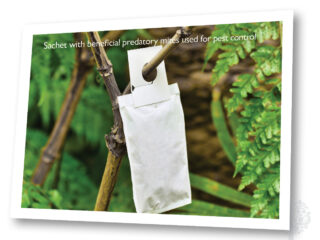Banker plants are a strategic tool used in integrated pest management (IPM) strategies. They serve as a habitat for beneficial insects, also known as biological control agents (BCAs), which help manage pests in agricultural settings. Here’s a breakdown of their functions and goals:
Supporting Beneficials Development
Banker plants provide a habitat and food source for beneficial insects, allowing them to settle and reproduce even before the targeted pest population establishes.
Increasing Ally Presence
By providing a constant food source, banker plants attract and maintain populations of beneficial insects, ensuring their presence in the crop environment.
Enhancing Effectiveness
Banker plants can increase the effectiveness of biological control by ensuring a consistent population of BCAs, which can lead to a higher success rate in pest management.
Risk Minimisation
Adopting a “standing army” approach with banker plants means that beneficial insects are already present when pests arrive, reducing the risk of pest outbreaks and minimising the need for reactive pest control measures.
Reducing Reliance on Traditional Products
By promoting natural enemies of pests, banker plants can help reduce reliance on chemical pesticides or other traditional pest control methods, thus promoting more sustainable agricultural practices.
Cost Reduction
Banker plants can reduce input costs associated with pest management by offering a more long-term and environmentally friendly solution.
Holistic Approach
Using banker plants supports a holistic approach to pest management by integrating biological control methods with other IPM strategies, such as habitat manipulation and crop rotation.
Aphid Banker Plant System
Parasitic wasps effectively manage aphid infestations in various settings, including ornamental gardens, greenhouse crops, and bedding plant nurseries. Employing an Aphid Banker Plant System, these wasps thrive within a self-contained sustainable ecosystem. Here’s how it works:
The system is a miniature rearing hub for natural enemies, ensuring a constant supply of beneficial insects to combat pests. Specifically, a non-pest prey species, such as the cereal aphid (bird cherry-oat aphid, Rhopalosiphum padi), is cultivated on grain plants like barley and wheat. These cereal aphids pose minimal threat to most greenhouse bedding plants, making them an ideal food source for parasitic wasps.
Aphidius colemani, a commonly utilized parasite, targets notorious aphid pests such as the green peach aphid (Myzus persicae) and cotton or melon aphid (Aphis gossypii). When the population of cereal aphids reaches a threshold capable of sustaining the parasite population, Aphidius colemani is introduced onto the banker plant. Over time, the parasite population burgeons, dispersing into the crop to seek out and eradicate pest aphids.
Keep producing fresh banker plants throughout the growing season to maintain efficacy. At the end of the season, it’s crucial to monitor and destroy aphid banker plants to prevent the presence of hyperparasites. These even more minuscule wasps lay their eggs within Aphidius colemani, threatening the system’s effectiveness.

The Advantages of Banker Plants
The advantages of this banker plant system are numerous: it offers a cost-effective means of cultivating a steady supply of aphid parasites, eliminating the need for recurrent purchases throughout the season. Additionally, it reduces the time lag between identifying an aphid infestation and procuring the necessary natural enemies from suppliers. Furthermore, it’s a straightforward process that requires minimal time and effort.
This system can be adapted to accommodate other beneficial organisms, such as Anystis baccarum, a versatile predatory mite, and Aphidoletes aphidimyza, the aphid predatory midge. By harnessing the power of parasitic wasps and other beneficial insects and mites, the Aphid Banker Plant System stands as a cornerstone in the arsenal of natural pest management strategies, offering an eco-friendly and sustainable approach to aphid control.
Other Food Sources in Banker Plant Setups
In some banker plant setups, pollen is an alternative food source for predatory insects or mites. Specific plant varieties have been identified for their enhanced reproductive benefits for natural enemies. For instance, the minute pirate bug, Orius insidiosus, known for preying on western flower thrips and two-spotted spider mites, exhibits increased longevity and reproduction when provided with pollen from ornamental pepper (Capsicum annuum ‘Purple Flash’), common mullein (Verbascum thapsus), or Lobularia maritima, commonly known as Alyssum.
These augmented reproductive benefits contrast those observed in predatory bugs simply purchased and released in standard biological control programs. Unlike the Aphidius colemani bird-cherry oat aphid system, which can be initiated as needed, the minute pirate bug system requires a lead time of three to four weeks before the crop cycle begins. For banker plant density, use one pepper plant per 500 square feet of production space. You will only require one mullein plant per 1,000 square feet of growing space.
Predatory mites, another beneficial addition to banker plant systems, can thrive on pollen plants designed to control pest mites, thrips, and other nuisances. Banker plants such as castor beans, corn, and ornamental peppers are commonly utilized in these systems. Because mites cannot fly, it’s crucial for banker plant foliage to overlap or touch crop foliage, facilitating their movement among infested crop plants.
Growers can establish colonies of predatory mites, ensuring that banker plants are populated with these beneficials a few days before or at the start of the crop cycle. This may involve infesting banker plants with mites weeks or even months before their placement in the greenhouse alongside crop plants. By incorporating pollen-based banker plant systems, growers enhance the effectiveness of natural pest management strategies and protect crops in a more sustainable and eco-friendly way.
Banker Plants as Effective IPM
In summary, banker plants play a crucial role in promoting biological control of pests by supporting beneficial insect populations, which ultimately helps to maintain crop health and reduce the need for chemical interventions.
Trending Products

Ahopegarden Hydroponics Growing Sys...

Ahopegarden Hydroponics Growing Sys...

CYBSDF hydroponic-Growing-Kits-and-...

Hydroponics Growing System Kit 12Po...

Hydroponics Growing System Kit Indo...

BN-LINK 8 Outlet Surge Protector wi...

Light-Blocking Cube Caps Compatible...

SKINNYBUNNY Rockwool Cubes 1 inch, ...

Reusable Plant Support Clips for Ga...

